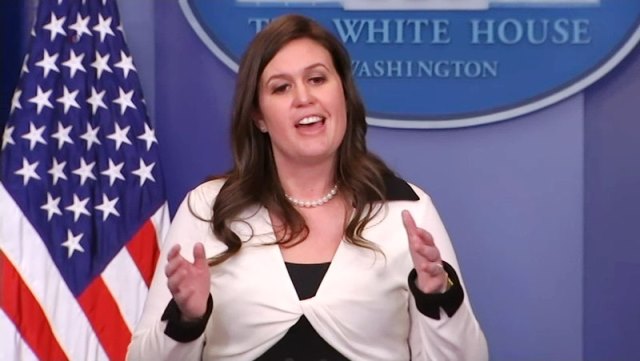
White House Deputy Press Secretary Sarah Huckabee Sanders. Image source: Wikimedia Commons
Recent actions by White House spokespeople demonstrate what can happen when PR and lawyers fail to communicate.
PR and marketing veteran Paul Maccabee cites two PR blunders by White House spokespeople that inadvertently sabotaged the White House legal strategy.
One was a comment during a press conference last month from White House press secretary Sarah Huckabee Sanders regarding the civil suit from porn star Stormy Daniels against President Trump. Daniels argues that a nondisclosure agreement meant to prevent her from discussing their alleged sexual affair was invalid because Trump had not signed it. Sanders said that “arbitration was won in the president’s favor.” The statement contradicts Trump’s assertion that he had no involvement with Daniels. It is an admission that the nondisclosure agreement exists and that it involves the President.
Trump was displeased with Sanders, according to CNN. “POTUS is very unhappy,” an anonymous source told CNN. “Sarah gave the Stormy Daniels storyline steroids yesterday.”
“A Foolish Thing to Say”
Another White House PR blunder was Deputy White House PR spokesperson Raj Shah’s remark during an interview with ABC-TV involving allegations that the president’s staff colluded with Russia to win the 2016 election. Shah stated: “The president, who would be aware of any types of efforts, has been pretty clear, understands and knows that there is no collusion.”
Trump’s legal team was probably aghast. That comment rules out the possible defense that others may have colluded with Russia without Trump’s knowledge.
“It was a really foolish thing to say — and one that they very likely will regret,” former federal prosecutor Peter Zeidenberg told The Washington Post.
The incidents reveal a lack of coordination and communications between the White House PR and legal personnel, says Stacy Bettison, Esq., an attorney and PR advisor. Legal and PR crisis experts agree that it’s crucial for lawyers and PR pros to work together and maintain communications. Lawyers need to keep PR updated about legal strategy, and PR pros need to articulate exactly what they need from the lawyers.
Advice for PR Pros Working with Lawyers
Ask the legal team to list their objectives. Have them share their legal position and strategy. Give the lawyers a list of questions journalists may ask. Review the prepared answers with lawyers. Ask attorneys what PR representatives can say and what they cannot say.
Appreciate the legal perspective. Lawyers strive to protect the organization against potentially enormous legal costs. While PR favors transparency, lawyers may prefer to stonewall the media and the public. That can frustrate PR pros who feel they underestimate the power of media and public opinion. But the common PR strategy of immediate public apology and constant media contact often cannot slow the barrage of negative media coverage.
Include a lawyer on the crisis management team. Even if a lawsuit didn’t prompt the PR crisis, lawyers can protect the organization from legal actions if they review and clear — but don’t dictate — media statements and other PR actions during a crisis. “Lawyers do not make ideal crisis managers, but their contribution is vital, since the cost of legal action is one of the main risks of a crisis situation, and the organization has a legal duty to make provision for the costs of litigation,” says Daniel Valentine, head of campaigns at Royal Academy of Engineering, in a LinkedIn Pulse post.
Involve PR in important legal decisions. “Too often we are engaged at the 11th hour, cleaning up a mess rather than preventing or at least mitigating it in the first place,” says Aaron Gordon at Schwartz Media Strategies. “By having a seat at the table from the very beginning, public relations can play a valuable role in shaping strategy as opposed to simply reacting to it.”
Consider the impact of insurance. A company is likely insured for legal liability but not for loss of business resulting from reputational damage, notes Bob Feldman, cofounder and principal of PulsePoint Group, a digital and management consulting firm. In that case, an immediate apology may be the better option. If there’s a significant risk of criminal prosecution or serious regulatory enforcement for which insurance is not the solution, reticence may be the better option.
Respect rules to preserve the attorney-client privilege, even though they complicate communications between outside PR people and the client.
Avoid absolute words like “never” that are easy to challenge and disprove in subsequent litigation, Feldman advises.
Bottom Line: It’s critical for legal teams and PR professionals to communicate and jointly develop PR and legal strategies. If lawyers don’t inform PR professionals about their legal strategies, media spokespeople may unintentionally wreck their legal defense. Experts urge PR pros to understand the organization’s legal risks and educate lawyers about the impact of public opinion.
William J. Comcowich founded and served as CEO of CyberAlert LLC, the predecessor of Glean.info. He is currently serving as Interim CEO and member of the Board of Directors. Glean.info provides customized media monitoring, media measurement and analytics solutions across all types of traditional and social media.




